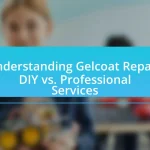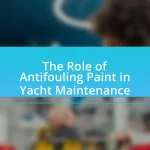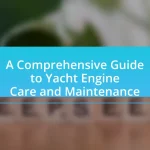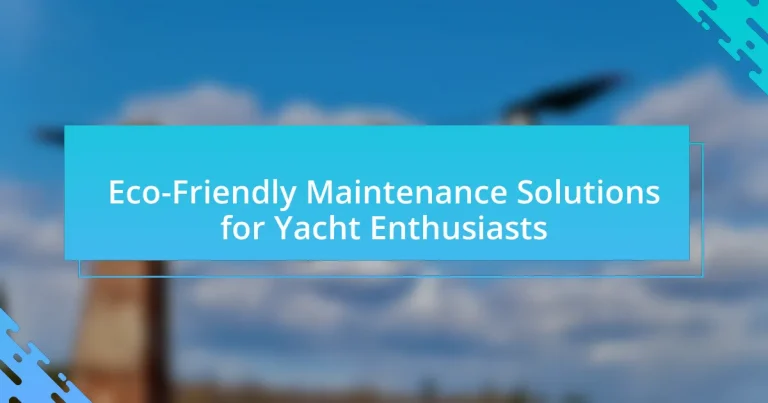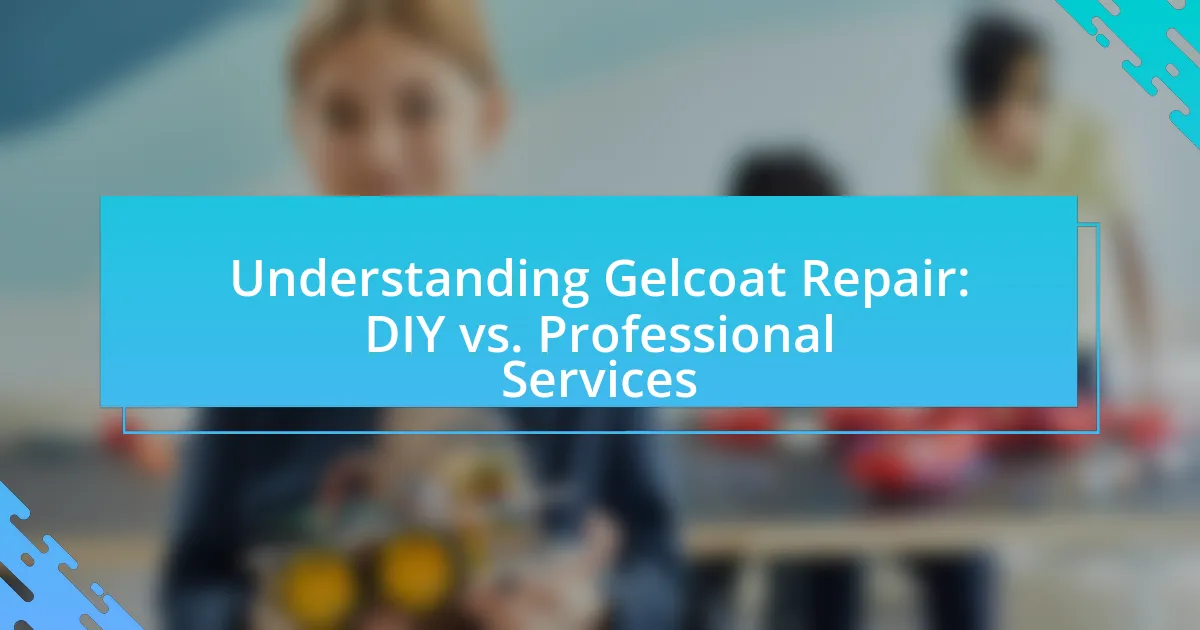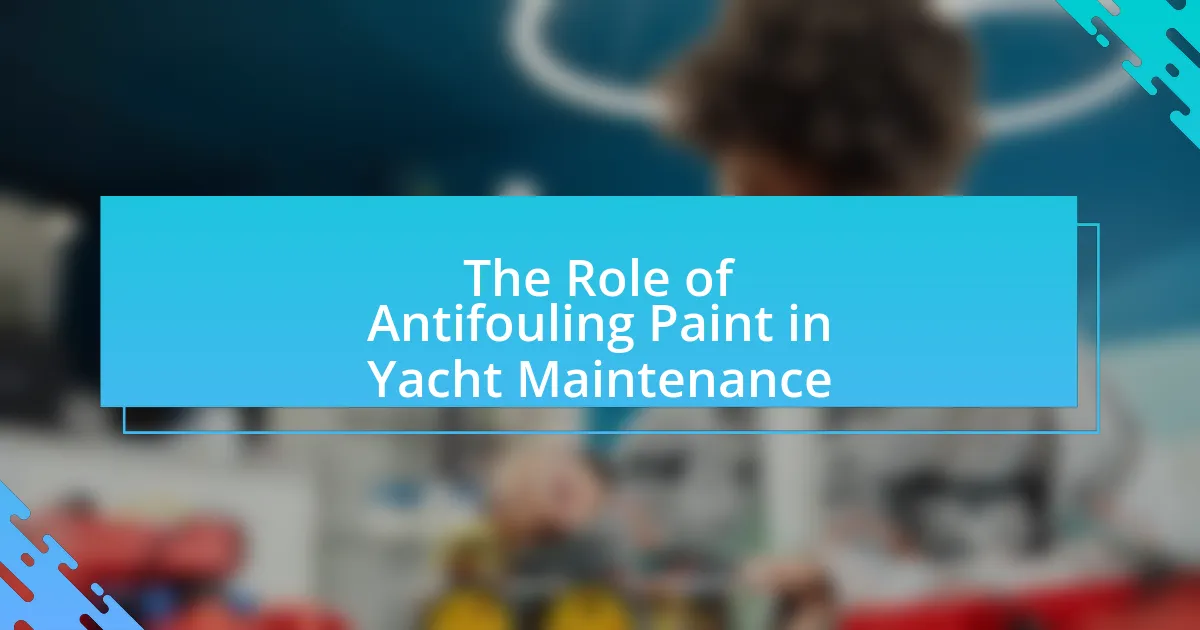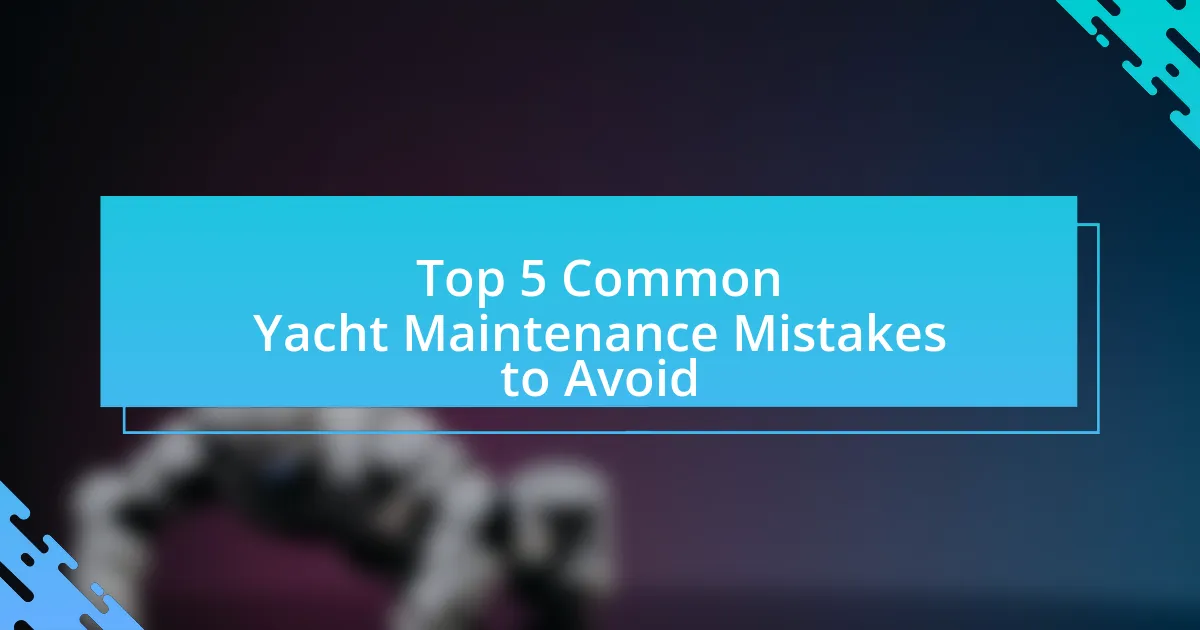Eco-friendly maintenance solutions for yacht enthusiasts focus on sustainable practices that minimize environmental impact while enhancing vessel performance. Key strategies include the use of biodegradable cleaning products, eco-friendly antifouling paints, and renewable energy sources like solar panels. The article outlines the differences between traditional and eco-friendly maintenance methods, highlighting the environmental consequences of conventional practices and the benefits of adopting sustainable alternatives. Additionally, it discusses the long-term advantages of eco-friendly solutions, practical tips for implementation, and resources available for yacht owners to transition towards more sustainable maintenance practices.
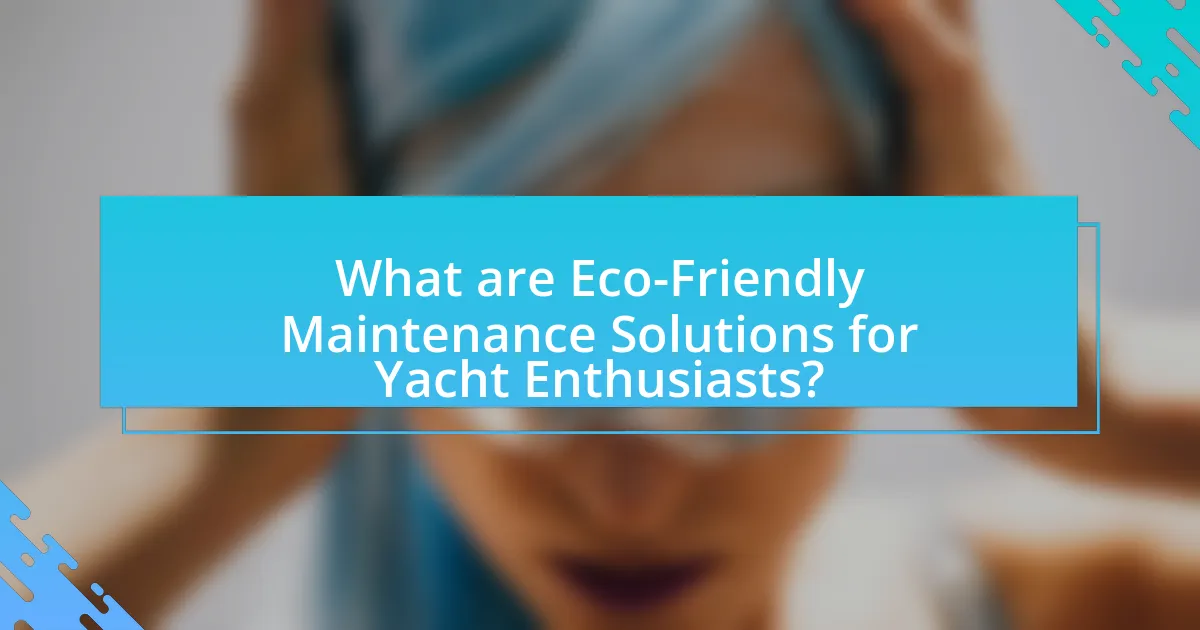
What are Eco-Friendly Maintenance Solutions for Yacht Enthusiasts?
Eco-friendly maintenance solutions for yacht enthusiasts include using biodegradable cleaning products, implementing waste management systems, and utilizing renewable energy sources. Biodegradable cleaning products reduce environmental impact by breaking down naturally without harming marine ecosystems. Waste management systems, such as onboard composting and recycling, minimize pollution and promote sustainability. Additionally, incorporating renewable energy sources like solar panels and wind turbines can significantly decrease reliance on fossil fuels, making yacht operations more sustainable. These practices not only protect marine environments but also align with growing regulations and consumer preferences for eco-conscious boating.
How do eco-friendly solutions differ from traditional yacht maintenance methods?
Eco-friendly solutions for yacht maintenance prioritize sustainability and environmental protection, contrasting with traditional methods that often rely on harmful chemicals and practices. Traditional yacht maintenance typically involves the use of toxic antifouling paints, petroleum-based cleaners, and non-biodegradable materials, which can lead to water pollution and harm marine life. In contrast, eco-friendly solutions utilize biodegradable cleaning agents, non-toxic antifouling options, and sustainable materials, significantly reducing the ecological footprint. For instance, studies have shown that using biocontrol agents in antifouling paints can decrease the release of harmful substances into the water, promoting healthier marine ecosystems.
What are the environmental impacts of traditional yacht maintenance?
Traditional yacht maintenance has significant environmental impacts, primarily due to the use of harmful chemicals and materials. The application of antifouling paints, which often contain toxic substances like copper and biocides, can lead to water pollution as these chemicals leach into marine ecosystems. Additionally, the disposal of waste materials, such as oil, solvents, and old paint, can contaminate soil and waterways if not managed properly. According to a study by the International Maritime Organization, improper yacht maintenance practices contribute to marine pollution, affecting biodiversity and water quality. Furthermore, the carbon footprint associated with maintenance activities, including transportation and energy use, exacerbates climate change effects.
How can eco-friendly solutions mitigate these impacts?
Eco-friendly solutions can mitigate environmental impacts by reducing pollution and conserving resources in yacht maintenance. For instance, using biodegradable cleaning products minimizes chemical runoff into waterways, protecting marine ecosystems. Additionally, implementing energy-efficient technologies, such as solar panels on yachts, decreases reliance on fossil fuels, thereby lowering greenhouse gas emissions. Research indicates that adopting eco-friendly practices can lead to a 30% reduction in harmful emissions associated with yacht operations, demonstrating their effectiveness in promoting sustainability.
Why is it important for yacht enthusiasts to consider eco-friendly maintenance?
It is important for yacht enthusiasts to consider eco-friendly maintenance because it minimizes environmental impact and promotes sustainability in marine ecosystems. Eco-friendly practices, such as using biodegradable cleaning products and non-toxic antifouling paints, help reduce pollution in waterways, which is crucial given that recreational boating contributes to water contamination. According to the National Oceanic and Atmospheric Administration (NOAA), recreational boating is responsible for significant oil and chemical spills, which can harm marine life. By adopting eco-friendly maintenance, yacht owners not only protect aquatic habitats but also enhance the longevity and performance of their vessels, aligning with growing consumer demand for sustainable practices in the boating industry.
What are the long-term benefits of adopting eco-friendly practices?
Adopting eco-friendly practices leads to significant long-term benefits, including reduced environmental impact, cost savings, and enhanced brand reputation. By minimizing waste and lowering emissions, eco-friendly practices contribute to a healthier ecosystem, which is crucial for sustaining marine life and biodiversity. For instance, the use of biodegradable cleaning products in yacht maintenance reduces water pollution, promoting cleaner oceans. Additionally, implementing energy-efficient technologies can lower operational costs; studies show that businesses adopting such practices can save up to 30% on energy bills over time. Furthermore, companies that prioritize sustainability often enjoy improved customer loyalty and market differentiation, as consumers increasingly prefer brands that demonstrate environmental responsibility.
How do eco-friendly solutions enhance the overall yachting experience?
Eco-friendly solutions enhance the overall yachting experience by promoting sustainability and reducing environmental impact. These solutions, such as solar panels and eco-friendly antifouling paints, allow yacht enthusiasts to enjoy their time on the water while minimizing harm to marine ecosystems. For instance, using solar energy can significantly reduce reliance on fossil fuels, leading to lower emissions and a quieter, more serene experience on the water. Additionally, eco-friendly maintenance practices, like using biodegradable cleaning products, contribute to cleaner oceans and healthier marine life, which enhances the natural beauty that yachters seek. Studies indicate that adopting sustainable practices can also increase the resale value of yachts, making eco-friendly solutions not only beneficial for the environment but also economically advantageous for yacht owners.
What types of eco-friendly maintenance solutions are available for yachts?
Eco-friendly maintenance solutions for yachts include biodegradable cleaning products, eco-friendly antifouling paints, and renewable energy systems such as solar panels. Biodegradable cleaning products minimize environmental impact by breaking down naturally without harming marine life. Eco-friendly antifouling paints reduce toxic leaching into the water, promoting healthier ecosystems. Renewable energy systems, like solar panels, decrease reliance on fossil fuels, providing sustainable power for onboard operations. These solutions collectively contribute to reducing the ecological footprint of yacht maintenance.
What are the best eco-friendly cleaning products for yacht maintenance?
The best eco-friendly cleaning products for yacht maintenance include biodegradable soaps, vinegar-based cleaners, and plant-based degreasers. Biodegradable soaps, such as those from brands like Seventh Generation, effectively clean surfaces without harming marine life. Vinegar-based cleaners, which can be used for glass and stainless steel, are non-toxic and environmentally safe. Plant-based degreasers, like those from Ecover, break down grease without the use of harsh chemicals, making them suitable for engine rooms and galley areas. These products not only maintain the yacht’s cleanliness but also protect the marine environment, aligning with sustainable boating practices.
How can sustainable materials be used in yacht repairs and upgrades?
Sustainable materials can be used in yacht repairs and upgrades by incorporating eco-friendly alternatives such as bamboo, recycled aluminum, and bio-based resins. Bamboo serves as a strong and lightweight replacement for traditional wood, reducing deforestation impacts. Recycled aluminum, often sourced from old boats or other products, minimizes energy consumption during production and lowers waste. Bio-based resins, derived from natural sources like plant oils, offer a less toxic option compared to conventional petroleum-based resins, enhancing environmental safety. These materials not only contribute to sustainability but also maintain performance and durability, aligning with the growing demand for eco-conscious practices in the maritime industry.

How can yacht enthusiasts implement eco-friendly maintenance solutions?
Yacht enthusiasts can implement eco-friendly maintenance solutions by utilizing biodegradable cleaning products and adopting sustainable practices such as regular hull cleaning to reduce antifouling paint usage. Biodegradable cleaners minimize environmental impact, as they break down naturally without harming marine ecosystems. Regular hull cleaning prevents the buildup of marine growth, which can lead to increased fuel consumption and emissions; studies show that a clean hull can improve fuel efficiency by up to 10%. Additionally, using renewable energy sources, such as solar panels, for onboard power needs further reduces the carbon footprint associated with yacht maintenance.
What steps should be taken to transition to eco-friendly maintenance?
To transition to eco-friendly maintenance, yacht owners should implement a series of strategic steps. First, they should conduct an assessment of current maintenance practices to identify areas where eco-friendly alternatives can be adopted. This includes switching to biodegradable cleaning products, which reduce harmful chemical runoff into marine environments.
Next, yacht owners should invest in energy-efficient systems, such as LED lighting and solar panels, which can significantly lower energy consumption and reliance on fossil fuels. Additionally, utilizing eco-friendly antifouling paints can minimize toxic substances released into the water, protecting marine life.
Regular training for maintenance staff on sustainable practices is essential to ensure that eco-friendly methods are consistently applied. Furthermore, establishing a waste management plan that emphasizes recycling and proper disposal of hazardous materials will contribute to a more sustainable operation.
Finally, yacht owners should consider collaborating with suppliers and service providers who prioritize sustainability, ensuring that all aspects of maintenance align with eco-friendly principles. These steps collectively contribute to a significant reduction in the environmental impact of yacht maintenance.
How can yacht owners assess their current maintenance practices?
Yacht owners can assess their current maintenance practices by conducting a thorough review of maintenance logs, evaluating the frequency and quality of maintenance tasks, and comparing their practices against industry standards. This assessment involves analyzing records of inspections, repairs, and servicing to identify patterns or gaps in maintenance. Additionally, yacht owners can utilize checklists based on best practices from organizations like the American Boat and Yacht Council, which provides guidelines for effective maintenance. By benchmarking their practices against these standards, yacht owners can pinpoint areas for improvement and ensure their maintenance strategies align with eco-friendly solutions.
What resources are available for learning about eco-friendly maintenance?
Resources available for learning about eco-friendly maintenance include online courses, books, and industry publications. Online platforms like Coursera and Udemy offer courses specifically focused on sustainable practices in maintenance. Books such as “Green Maintenance: A Guide to Sustainable Practices” provide in-depth knowledge on eco-friendly techniques. Additionally, publications like “Marine Industry News” and “Yachting World” frequently feature articles on sustainable maintenance practices for yachts, offering insights from experts in the field. These resources collectively equip yacht enthusiasts with the necessary knowledge to implement eco-friendly maintenance solutions effectively.
What challenges might yacht enthusiasts face when adopting eco-friendly solutions?
Yacht enthusiasts may face significant challenges when adopting eco-friendly solutions, primarily due to high costs and limited availability of sustainable materials and technologies. The initial investment for eco-friendly equipment, such as solar panels or hybrid engines, can be substantially higher than traditional options, deterring many owners. Additionally, the market for eco-friendly products is still developing, leading to a scarcity of reliable suppliers and options tailored specifically for yachts. Furthermore, regulatory compliance can pose challenges, as enthusiasts must navigate varying environmental regulations across different regions, which can complicate the adoption of new technologies. These factors collectively hinder the transition to more sustainable practices in yacht maintenance and operation.
How can these challenges be overcome?
To overcome the challenges of eco-friendly maintenance solutions for yacht enthusiasts, adopting sustainable practices and materials is essential. Implementing biodegradable cleaning products reduces environmental impact, while using renewable energy sources, such as solar panels, can power maintenance operations. Research indicates that transitioning to eco-friendly antifouling paints can significantly lower toxic emissions into marine environments, thus protecting aquatic life. Additionally, regular training for yacht owners and crew on sustainable practices enhances awareness and compliance, leading to more effective implementation of eco-friendly solutions.
What support systems exist for yacht enthusiasts making this transition?
Support systems for yacht enthusiasts transitioning to eco-friendly maintenance solutions include specialized training programs, online forums, and industry certifications. These training programs, such as those offered by the International Yacht Training Worldwide, provide education on sustainable practices and technologies. Online forums like SailNet and Cruisers Forum facilitate community support and knowledge sharing among yacht owners. Additionally, certifications from organizations like the Marine Stewardship Council validate eco-friendly practices, ensuring that yacht enthusiasts can confidently adopt sustainable methods.

What are the best practices for maintaining eco-friendly solutions on yachts?
The best practices for maintaining eco-friendly solutions on yachts include using biodegradable cleaning products, implementing waste management systems, and utilizing renewable energy sources. Biodegradable cleaning products minimize environmental impact by reducing harmful chemicals released into the water. Effective waste management systems, such as recycling and proper disposal of hazardous materials, prevent pollution and promote sustainability. Additionally, incorporating renewable energy sources like solar panels or wind turbines can significantly reduce reliance on fossil fuels, leading to lower emissions and a smaller carbon footprint. These practices collectively contribute to a more sustainable yachting experience.
How can yacht enthusiasts ensure the effectiveness of eco-friendly maintenance solutions?
Yacht enthusiasts can ensure the effectiveness of eco-friendly maintenance solutions by selecting products that are certified as environmentally safe and by implementing best practices for their application. Research indicates that using biodegradable cleaners and non-toxic antifouling paints significantly reduces environmental impact, as these products minimize harmful runoff into marine ecosystems. Additionally, regular training on sustainable practices for crew members enhances the proper use of these solutions, ensuring they are applied effectively and consistently.
What routine checks should be performed to maintain eco-friendly systems?
Routine checks to maintain eco-friendly systems include inspecting and cleaning the vessel’s wastewater treatment systems, checking for leaks in fuel and oil systems, and ensuring that all eco-friendly cleaning products are stocked and used correctly. Regularly monitoring the efficiency of energy systems, such as solar panels and wind turbines, is also essential. These checks help prevent pollution and ensure that the yacht operates sustainably. For instance, the International Maritime Organization emphasizes the importance of maintaining equipment to minimize environmental impact, highlighting that regular inspections can significantly reduce the risk of spills and emissions.
How can yacht owners educate their crew about eco-friendly practices?
Yacht owners can educate their crew about eco-friendly practices by implementing structured training programs that focus on sustainable operations. These programs should include workshops on waste management, fuel efficiency, and the use of eco-friendly products. For instance, the International Maritime Organization emphasizes the importance of training in reducing marine pollution, highlighting that informed crew members can significantly lower environmental impact. Additionally, providing access to resources such as manuals on eco-friendly practices and encouraging participation in environmental certifications can further enhance crew knowledge and commitment to sustainability.
What common mistakes should be avoided in eco-friendly yacht maintenance?
Common mistakes to avoid in eco-friendly yacht maintenance include using harmful cleaning products, neglecting proper waste disposal, and overlooking regular inspections of eco-friendly systems. Harmful cleaning products can release toxic substances into the water, harming marine life; therefore, using biodegradable and non-toxic alternatives is essential. Neglecting proper waste disposal can lead to pollution, as improper handling of sewage and waste can contaminate waterways. Regular inspections of eco-friendly systems, such as bilge pumps and waste treatment systems, are crucial to ensure they function correctly and do not leak harmful substances. These practices are vital for maintaining an environmentally responsible yacht.
How can yacht enthusiasts identify and rectify these mistakes?
Yacht enthusiasts can identify and rectify mistakes by conducting regular inspections and utilizing eco-friendly maintenance practices. Regular inspections help in detecting issues such as leaks, corrosion, or equipment malfunction early, allowing for timely repairs. Implementing eco-friendly maintenance solutions, such as using biodegradable cleaning products and sustainable materials, not only minimizes environmental impact but also enhances the longevity of the yacht. For instance, studies show that using non-toxic antifouling paints can reduce harmful emissions and improve vessel performance. By combining thorough inspections with sustainable practices, yacht enthusiasts can effectively manage and correct maintenance errors.
What resources can help prevent these common pitfalls?
Resources that can help prevent common pitfalls in eco-friendly yacht maintenance include comprehensive guides, online forums, and specialized workshops. Comprehensive guides, such as “The Green Boater’s Guide” by the Marine Conservation Society, provide detailed information on sustainable practices and products. Online forums like the Cruisers Forum offer peer support and shared experiences from yacht enthusiasts who have faced similar challenges. Specialized workshops, often hosted by marine conservation organizations, teach practical skills and eco-friendly techniques, ensuring yacht owners are well-equipped to avoid common mistakes.
What practical tips can yacht enthusiasts follow for eco-friendly maintenance?
Yacht enthusiasts can follow several practical tips for eco-friendly maintenance, including using biodegradable cleaning products, implementing waste management practices, and opting for eco-friendly antifouling paints. Biodegradable cleaning products reduce harmful chemical runoff into marine environments, while effective waste management, such as recycling and proper disposal of hazardous materials, minimizes pollution. Additionally, eco-friendly antifouling paints, which contain fewer toxic substances, help protect marine life while maintaining yacht performance. These practices contribute to sustainable boating and help preserve marine ecosystems.
